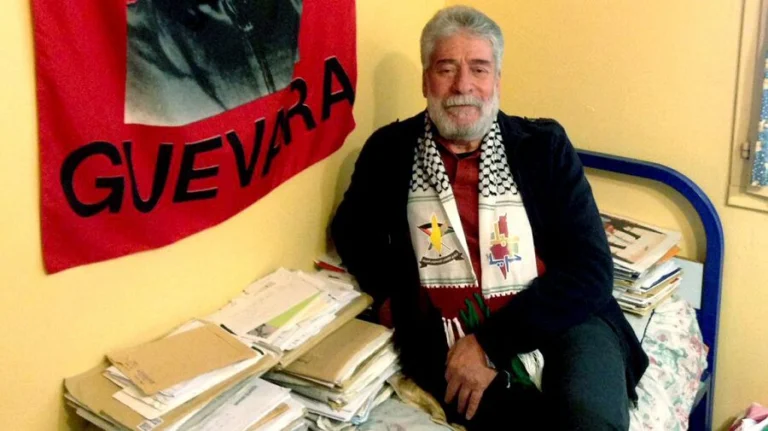Georges Ibrahim Abdallah to Be Freed After 41 Years: A Political Detention Comes to an End
After more than four decades behind bars, Georges Ibrahim Abdallah is set to return to Lebanon, ending what many consider Europe’s most politically charged incarceration.

Georges Ibrahim Abdallah to return to Lebanon after 41 years in French custody, following a court order ending the political deadlock. Photo: @MohsenAlmohade
July 20, 2025 Hour: 2:41 am
Georges Ibrahim Abdallah, a Lebanese communist militant jailed in France since 1984, will be released on July 25, ending the longest political imprisonment in modern European history.
RELATED:
Destruction as Policy: Satellite Data Shows 70% of Gaza Obliterated
A French court has ordered the conditional release of Georges Ibrahim Abdallah, ending a detention that began in 1984 and became one of the most protracted political imprisonments in Europe. Convicted in 1987 for complicity in the killings of two diplomats in Paris, Abdallah’s case has long been considered politically charged, shaped by external pressure, especially from the United States.
The Paris Court of Appeal ruled that Abdallah, now 74, will be released next Friday on the condition that he leaves French territory permanently. The Lebanese embassy in Paris is overseeing the arrangements for his return.
Although Abdallah fulfilled all legal conditions for parole more than two decades ago, successive French governments refused to execute court orders authorizing his release. His attorney, Jean-Louis Chalanset, stated, “The United States exerted pressure to obstruct the legal process leading to his release.” He described the decision as not only legal but political, and confirmed that Abdallah remains “a communist militant who supports the Palestinian struggle and fights against the invasion of his country by Israel.”
Born in the northern Lebanese town of Qoubaiyat in 1951, Abdallah came from a Maronite Christian family and studied philosophy in France. There, he was exposed to Marxist and revolutionary thought. After returning to Lebanon during the civil war, he joined the Popular Front for the Liberation of Palestine, General Command (PFLP-GC) and engaged in armed resistance aligned with anti-colonial and anti-imperialist movements in the region and beyond.
Though French authorities linked him to the 1982 assassinations of U.S. Army Lt. Col. Charles Ray and Israeli diplomat Yacov Barsimantov, no direct evidence connected him to the acts. Observers have long criticized the trial as politically driven, arguing that the verdict rested more on Abdallah’s ideological associations than on evidence. Jacques Attali, an adviser to then-President François Mitterrand, later stated that the only formal charge supported by evidence was Abdallah’s possession of a forged passport.
Abdallah became eligible for release in 1999. Yet, each judicial approval was blocked by France’s Interior Ministry, often citing diplomatic concerns. In 2013, a court authorized his release on the condition of deportation to Lebanon, but the deportation order was never issued.
Throughout his imprisonment, Abdallah refused to renounce his political views. He authored statements from prison addressing Palestinian rights and regional struggles, including a 2024 message on Palestinian Prisoners’ Day in which he asserted that the issue of detainees must remain central to the broader liberation cause.
Support for Abdallah has remained strong in Lebanon and parts of France. Annual demonstrations took place outside Lannemezan Prison and the French embassy in Beirut, where activists and leftist movements demanded his release. Slogans such as “Freedom for Georges Abdallah” and “France jails the honorable” were regularly heard at these gatherings.
Lebanese officials, including former Prime Minister Najib Mikati and President Michel Aoun, raised the case in high-level talks with French authorities. In 2018, Lebanon’s General Security was tasked with re-engaging French intelligence to secure Abdallah’s release. Despite prolonged delays, mobilizations continued, including a 2021 sit-in marking his 70th birthday.
Following the recent court decision, preparations began in Beirut and in Abdallah’s hometown to welcome his return. Al Mayadeen reported that Abdallah has been officially notified of the ruling and that Lebanese diplomats will facilitate his transfer from prison to the airport.
Abdallah’s release closes a case long seen as emblematic of how legal systems can be shaped by external power dynamics. s he returns to Lebanon, his case stands as a testament to the enduring tensions between legal sovereignty, international pressure, and political conviction.
Author: MK
Source: Al Mayadeen - AP

